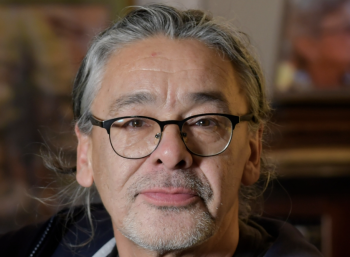Image Caption
Local Journalism Initiative Reporter
Windspeaker.com
Neil Diamond’s latest film is one that he kind of stumbled into.
Diamond, a member of the Cree Nation of Waskaganish in Quebec, created the movie Red Fever, which sees him travelling to various countries to learn why people are fascinated with the stereotypical image of Natives.
Red Fever had its Canadian theatrical release this past June.
While working on that film, Diamond was inspired to write and direct another documentary titled So Surreal: Behind the Masks.
This movie had its world premiere earlier this month at the Toronto International Film Festival (TIFF).
Diamond’s latest film sees him once again travelling to various parts of the world to understand the history of Yupʼik and Kwakwa̱ka̱ʼwakw ceremonial masks.
The film examines the masks’ influence on the Surrealist art movement and includes scenes where efforts are made to return these masks, many of which were stolen, to their rightful owners.
Diamond said he himself learned quite a lot during the making of So Surreal: Behind the Masks.
“I don’t have a great knowledge of art but I know what I like,” he said, adding Spain’s Salvador Dali and American Man Ray are two of his favourite artists. “That’s pretty much all I knew about the surrealists. I knew very little. So, I learned a lot with this film.”
Joanne Robertson co-wrote and co-directed So Surreal: Behind the Masks with Diamond. She had worked as a story producer/researcher for Red Fever.
Robertson explained that while Red Fever was being made Diamond and herself were among those who attended an art exhibit in Montreal, which focused on Picasso’s influence on African masks.
“As part of that exhibit we also learned the story of the masks and how there was this influence of Northwest coast masks on the surrealist,” she said. “So somehow we kind of ended up in that rabbit hole. And that sort of fit really well into Red Fever, which was the story of influence of sports, fashion, politics and at the time art.
“But from that exhibit and from the stories that we heard following going down that rabbit hole we ended up connecting with folks from out west in Alert Bay (in British Columbia),” she said.
That’s when it was discovered that Indigenous masks from that community ended up in the hands of surrealists in various locations. Some of those masks were stolen from the community in 1921.
Many Indigenous masks ended up in the hands of collectors or in museums. In his latest film Diamond attempts to get these masks returned.
“They are beautiful,” he said. “They weren’t created to be displayed. They tell a story, unbelievable stories, incredible stories behind the mask.”
Diamond believes returning masks will help with reconciliation efforts.
“I think so,” he said. “Things are changing, slowly. It’s just like if I stole something from you. Let’s say I stole your watch or something. You loved this watch. It’s a family heirloom. And if I returned it, I think you’d be very grateful.”
Robertson also believes repatriation efforts of the masks will help with reconciliation.
“I think it does move the needle a bit, hopefully,” she said. “In terms of reconciliation, the stories that are shared and if people start to listen like we talk about in the film, start listening to these stories and when they’re seeing the museums they’re seeing the pieces and they’re understanding where these pieces come from, I think is a part of reconciliation.”
Diamond is thrilled So Surreal: Behind the Masks had its world premiere at TIFF, one of the more prestigious festivals around.
“I never really expected it,” he said. “I was really surprised that we were invited. I’m grateful and happy.”
Diamond was pleased with the exposure that screening at TIFF will bring.
“I think the people that we talked to in the film are going to be very happy with the exposure that they’re getting,” he said. “They want people to know this story and TIFF is a great place to have this story told.”
The film will also soon be available on Canada’s Documentary Channel.

